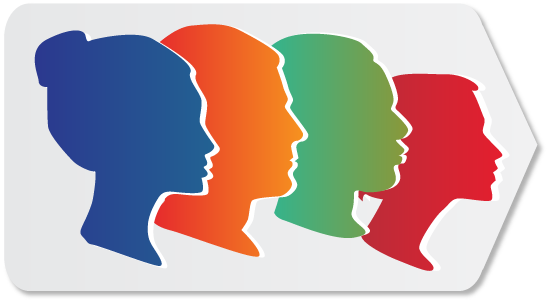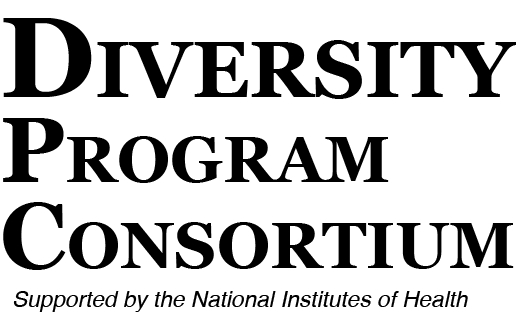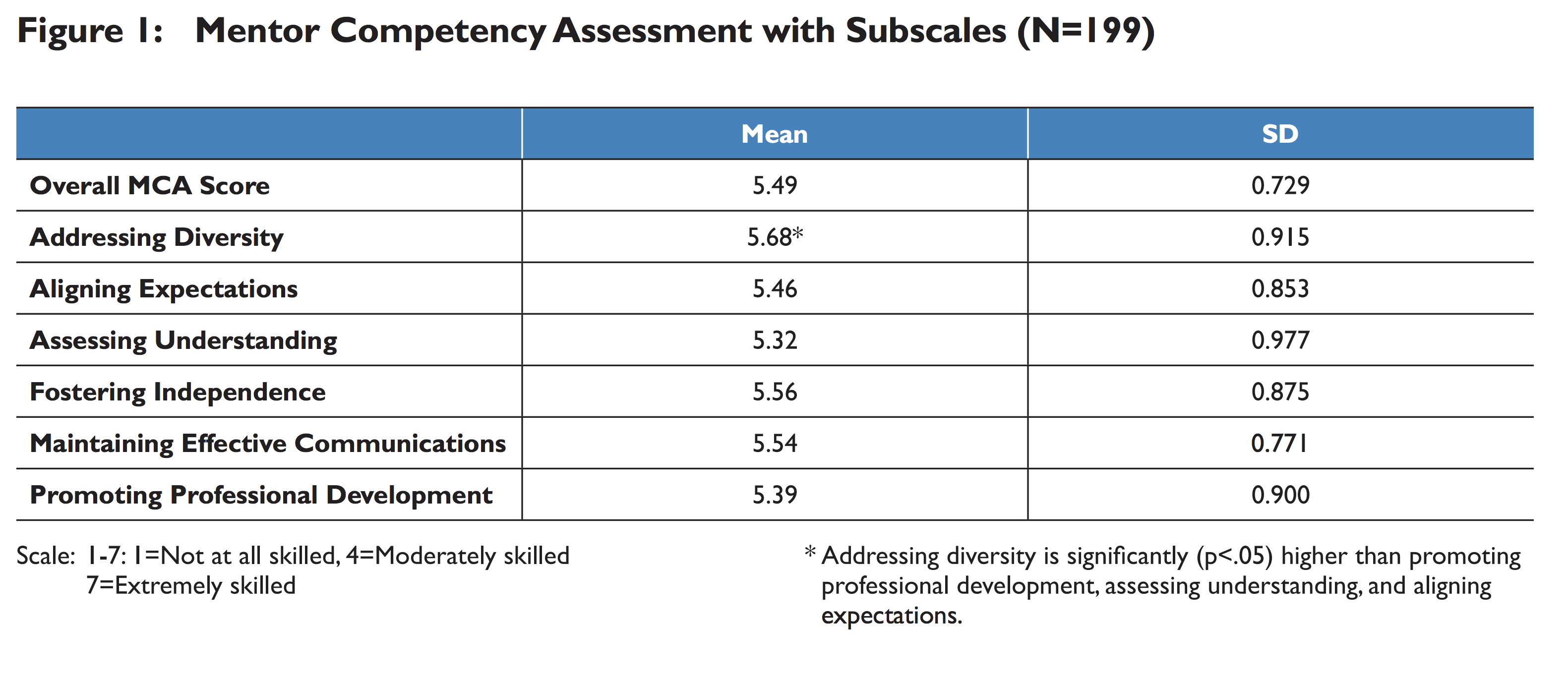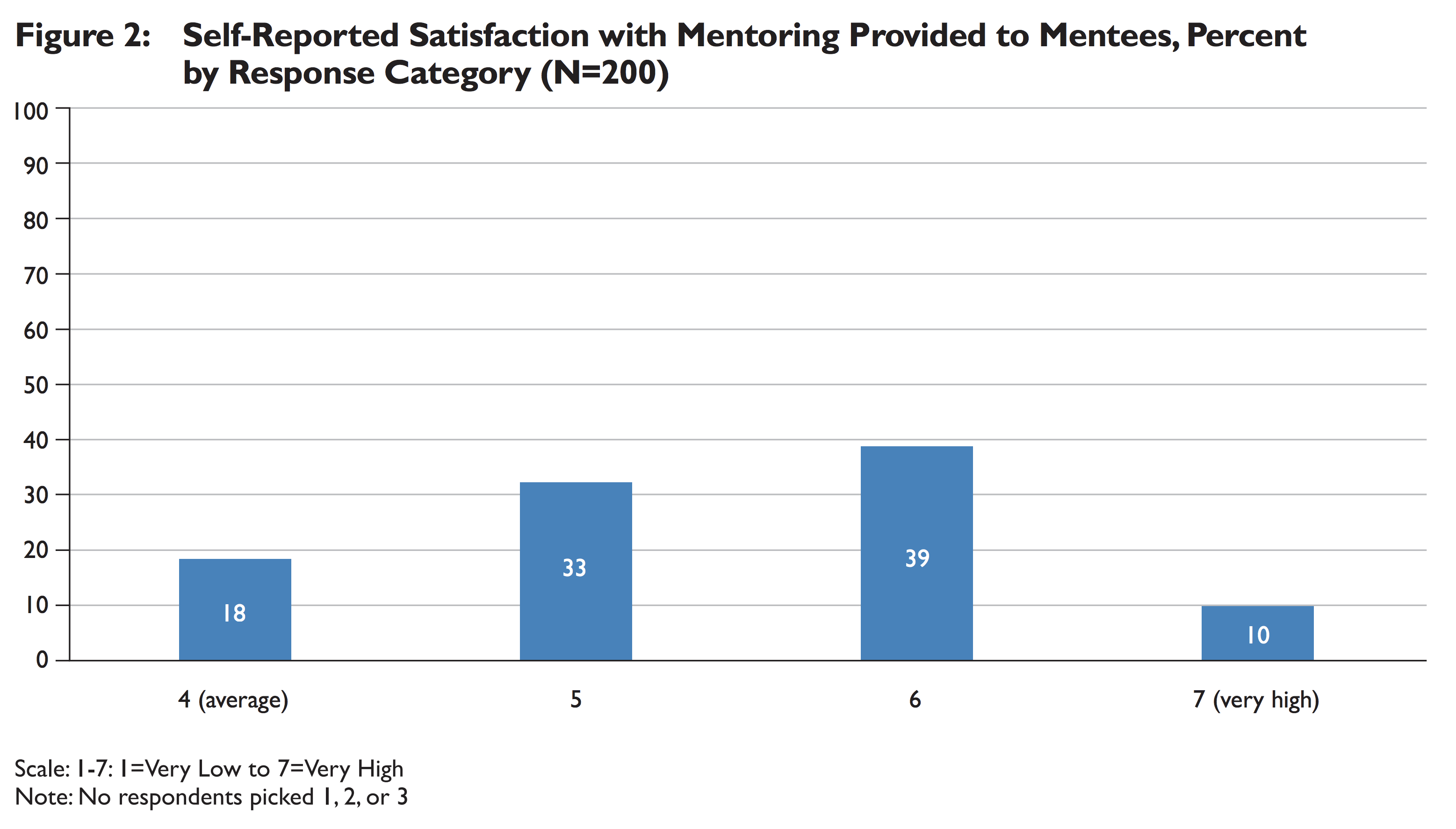



October 2018
The National Research Mentoring Network (NRMN) provides researchers across all career stages with mentorship and professional development programming that emphasizes the benefits and challenges of diversity, inclusivity and culture (https://nrmnet.net). Individuals register on the NRMN online portal to use virtual mentoring, access online resources, or sign up for a wide variety of training events. When enrolling through the online portal, all registrants are required to identify as a mentor or mentee, regardless of how they use NRMN.
This brief reports on those who identified themselves as mentors when registering on the portal and completed the 2016-17 NRMN Annual Follow-up Survey. The basic characteristics of this group of respondents suggest that early registrants with NRMN have a wealth of mentoring experiences and report providing high quality mentoring. These findings suggest that this initial pool of potential NRMN mentors bring with them the characteristics and experiences for effective mentoring and can serve as a resource to early career biomedical workforce mentees.
There is growing evidence of the importance of mentorship in the development and success of early career investigators.1,2 Having effective mentors has been linked with mentees’ academic and career success (e.g., higher productivity, earlier promotions, and a higher likelihood of staying at their institutions). Consequently, it is important to focus on the quality of mentorship and experiences mentors hold to identify avenues for providing high quality mentoring.
It is possible to increase mentorship skills3 and to assess skill levels through self-reported measures.4,5 Given the significance of mentoring skills and quality to trainee success in the biomedical sciences, hallmarks of success of the Diversity Program Consortium (DPC),a an overarching initiative that NRMN is part, include mentor quality, self-efficacy, and number of individuals mentored (see end of brief for more details).
Respondents in this sample are restricted to those who registered with NRMN using the “mentor” (vs. “mentee”) designation. Using data from the 2016-17 NRMN Annual Follow-up Survey (NAFS), we present a first look at the overall composition of online registrants who identified themselves as mentors.
Of the 336 respondents who identified themselves as mentors, approximately 34% were from underrepresented minority (URM) groups,c most were female (59%), the majority (71%) held a PhD, and most held faculty positions (58%).
Nearly three-quarters (72%) of those registering online in the mentor category had been the principal investigator (PI) of any extramural grant in the past five years, including 39% who had been the PI of an NIH-funded grant.
Almost all (93%) of these registrants stated they regularly mentored students, junior faculty, junior researchers, or peers on biomedical career or research issues. In the five years prior to signing up on the NRMNportal, one third of all respondents mentored eight or fewer people, one third mentored between 9-15 people, and one-third mentored more than 15 people.
Over one-third (39%) of respondents reported participating in training to improve their skills as a mentor outside of NRMN. Data specific to NRMN-sponsored mentor training will be reported in a later brief.
Of the online activities that registrants initially indicated, 58% of respondents listed the formal guided virtual mentoring (GVM) program as their purpose for registering. There were no significant differences in the levels of mentor competency and satisfaction between registrants who registered for the GVM and those that registered for other resources.
Self-assessed mentoring competency is measured using the 26-item Mentor Competency Assessment (MCA) scale.7 The MCA has six subscales that assess the following domains: maintaining effective communication, aligning expectations, assessing understanding, addressing diversity, fostering independence, and promoting professional development.
The NRMN survey sample rated themselves more than moderately skilled overall (M = 5.48, SD = 0.73) on the 26-item Mentor Competency Assessment (MCA) where 1=Not at all skilled, 4=Moderately skilled, and 7=Extremely skilled. This is similar to the preintervention levels found in another mentor training program.4
NRMN online registrant respondents rated themselves most highly in the addressing diversity domain, likely reflecting marketing of the NRMN portal as a place where scholars and mentors committed to enhancing diversity could find each other (Figure 1).

Mentoring satisfaction was measured using a one item measure of global satisfaction,7 “How satisfied are you with the mentoring you are providing to your mentee?” Most of the NRMN online registrants rated themselves as having better than average satisfaction with the mentoring they are providing (Figure 2).

In this brief, we provide the basic characteristics of NRMN online portal registrants. Future analyses will examine the relationship between engagement in NRMN activities and mentoring, research, and career outcomes. Future analyses will also examine outcomes linked with hallmarks across underrepresented groups. While all early career researchers benefit from mentoring, students from URM groups often have fewer network resources that mentoring can ameliorate, making the availability of a highly qualified pool of mentors particularly important.3,8
While this current analysis is limited to online registered mentors and is not yet linked to NRMNsponsored activities, future surveys will include a much larger group of NRMN participants and their NRMN engagement in both on-line and in-person programming.
The data suggest that, at this early stage, NRMN attracted highly skilled scholars who can serve as virtual mentors and will hopefully become more skilled as they engage in the various resources NRMN offers. These online registrants rated themselves well above average, though not at the top of the scale, on mentor competency. This suggests that they can already provide high quality mentoring, but that they also recognize there are areas where their mentoring skills could improve. Results also suggest this pool of potential GVM mentors are confident in fostering independence and addressing diversity among those they mentor critical skills in the development and success of early career investigators. Taken together, these results suggest that this group of online registrants should be well equipped to serve as mentors for the early career biomedical workforce pool.
The 2016-17 NRMN Annual Follow-up Survey was administered online to 1251 NRMN participants up to a year after they had registered as a “mentor” through the online portal up. Completed surveys were obtained from 336 individuals yielding a response rate of 27%.
The DPC is determining the effectiveness of innovative approaches to engage individuals from diverse backgrounds and help them prepare for and succeed in biomedical research careers. It supports transformative approaches to student engagement, research training, mentoring, faculty development, and infrastructure development.
NRMN is one of three initiatives within the DPC. It is developing a national network of mentors and mentees from biomedical disciplines to provide high quality mentorship, professional development, mentor/mentee training, networking opportunities, and resources to diverse individuals from the undergraduate to early career faculty levels. See https://nrmnet.net/ and www.diversityprogramconsortium.org/pages/nih.
aHallmarks are short and long-term desired outcomes of the programs. The original DPC approved hallmarks included FAC-B1 (mentor self-efficacy), FAC-B15 (number of trainees mentored) and FAC-B16 (mentor quality). For a full listing of hallmarks, see www.nigms.nih.gov/training/dpc/Pages/success.aspx
bA comprehensive table of sociodemographic characteristics for participants is located here: www.diversityprogramconsortium.org/briefs
cIncludes Hispanic, African American, American Indian/Alaska Native, Native Hawaiian or Other Pacific Islander, and two or more races where at least one is from this list.6
1Straus SE, Johnson MO, Marquez C, Feldman MD. Hokanson SC, Goldberg BB. Proactive Postdoc Mentoring. The Postdoc Landscape: Elsevier; 2018:91-120
2Pfund C, House SC, Asquith P, et al. Training mentors of clinical and translational research scholars: a randomized controlled trial. Academic medicine: journal of the Association of American Medical Colleges. 2014;89(5):774.
3Gandhi M, Johnson M. Creating more effective mentors: mentoring the mentor. AIDS and Behavior. 2016;20(2):294-303.
4Pfund C, Byars-Winston A, Branchaw J, Hurtado S, Eagan K. Defining attributes and metrics of effective research mentoring relationships. AIDS and Behavior. 2016;20(2):238-248.
5Wyre DC, Gaudet CH, McNeese MN. So you want to be a mentor? An analysis of mentor competencies. Mentoring & Tutoring: Partnership in Learning. 2016;24(1):73-88.
6National Institues of Health. Updated Notice of NIH’s Interest in Diversity NOT-OD-18-210. 2018. https://grants.nih.gov/grants/guide/notice-files/NOT-OD-18-210.html
7Fleming M, House MS, Shewakramani MV, et al. The mentoring competency assessment: validation of a new instrument to evaluate skills of research mentors. Academic medicine: journal of the Association of American Medical Colleges. 2013;88(7):1002.
8Beasley MA, Fischer MJ. Why they leave: The impact of stereotype threat on the attrition of women and minorities from science, math and engineering majors. Social Psychology of Education. 2012;15(4):427-448.
This data brief is published by the Diversity Program Consortium’s (DPC) Coordination and Evaluation Center (CEC) at UCLA.
info@diversityprogramconsortium.org
Brief #2018-2
